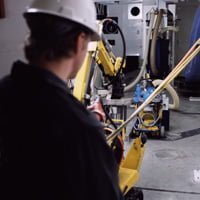
The provision of energy to meet the needs of society is a pressing issue today. Many of the world’s non-renewable resources such as coal, oil and gas are limited in supply. From the 1970s onwards, the UK was relatively protected by the discovery and exploitation of North Sea oil and gas. This increased supply benefited UK citizens and met more of their energy needs. For a short time oil and gas were no longer as scarce as before the discoveries. However, this supply will also run out one day.
The UK government is therefore seeking to develop other fuel supply channels. The problem the government faces is being too dependent on foreign suppliers. This involves a real risk of having to pay excessive prices to provide energy for homes and businesses. The government is actively encouraging the development of alternative fuels such as wind power and wave power.
Another alternative is nuclear energy. Other countries rely on nuclear energy. France supplies over 80% of its energy in this way. The UK government is currently exploring the possibility of developing modern nuclear plants on some of its existing nuclear energy sites. However, it must first make sure that all of the old sites are cleaned up in a safe and efficient way. The Nuclear Decommissioning Authority (NDA) is the public sector body responsible for this.
A public sector body is appointed by the government to operate in the public interest. This means working for the benefit of society as a whole. It is accountable for its actions to a government minister and to Parliament. Any work undertaken must meet government requirements for safety and the efficient use of resources.
NDA is the owner of a number of nuclear sites and facilities. These include Sellafield in Cumbria, Dounreay in Scotland and the original fleet of Magnox Power Stations. The mission of the NDA is to deliver safe, sustainable and publicly acceptable solutions to the challenge of nuclear clean-up and waste management. In practice this involves:
- never compromising on safety or security
- taking full account of social and environmental responsibilities
- always seeking value for money for taxpayers
- actively engaging with stakeholders
This mission requires that the nuclear industry recruits the right people to work in this sector. The NDA is the driver in securing a flexible and sustainable world-class workforce for the next 100 years.

The nuclear industry has to be the safest place to work as there is no room for error. This demands that employers and employees maintain the highest safety practices of any industry in the world. Recently there has been a low uptake of science, technology, maths and engineering at a higher level within schools and at universities. This means that there are fewer people in the market with the required skills.
Like any organisation, NDA has a responsibility to respond to its stakeholders’ interests. It works closely with all stakeholder groups, carrying out extensive consultation exercises with all parties in order to create a world-class industry with safety paramount.
This case study focuses on how the Nuclear Decommissioning Authority listens to and makes sure that it meets legal and other responsibilities to its stakeholders.
Stakeholders and business legislation

The main objective of the NDA is to take responsibility for the decommissioning and clean-up of the UK’s public sector nuclear legacy. Decommissioning is the final phase in the life cycle of a nuclear installation. The term refers to all activities from the shutdown and removal of nuclear material (fissile) to the environmental restoration of the site.
Once a nuclear facility has been decommissioned, usually because it is no longer efficient in providing energy, the site needs to be cleaned-up to remove any possible nuclear contamination. Work on nuclear sites is carried out by specialist companies hired on behalf of NDA. These can also sub-contract to deliver efficient work programmes.

NDA manages the contracts to ensure consistency in following safety regulations and efficiency. NDA also works with a range of stakeholders. A stakeholder is an individual or group with an interest in the work of the organisation or who is affected by the organisation.
NDA works within a framework of business legislation to meet stakeholders’ needs. For example, any company working for NDA is issued a contract which is subject to contract law. This is an exchange of promises between two or more parties that the law will enforce.

Legislation in the UK governing safety at work and employment comes from three main sources.
UK law is influenced by European Union laws and business activities must comply with EU regulations. The most important law affecting NDA is the Energy Act, 2004. This Act of Parliament makes health and safety, security and the environment NDA’s main priority.
The UK government has recently committed itself to a statutory obligation under the new Climate Change Bill. It must reduce CO2 emissions by over 60% from current levels by 2050. In monitoring the impact of nuclear power stations it is important to take these considerations into account. In decommissioning and cleaning up sites, it is essential to consider how clean-up activities will affect the environment.
NDA’s view is that ‘no accident is acceptable’. NDA believes that its responsibilities go beyond legal frameworks. In addition to what is necessary under the law, it imposes self-regulation covering every aspect of its operations. For example, employees driving on NDA business must call in to report that they have arrived at their destination safely.
The welfare of the workforce is essential. This includes regular medical health check ups, and careful follow-up on any reported illness.
Health and safety legislation
All workers need health and safety protection. These include contractors and the local community. It is in the interest of a business to protect its workforce or any group who might be affected by its operations.
There are a number of health and safety laws that affect all businesses, including:
- HSAWA – The Health and Safety at Work Act, 1974 sets out a legal responsibility of businesses to create healthy and safe working conditions. Employees are expected to work in a safe way with due respect for fellow employees and the wider public. Individuals are responsible for taking care, using the right equipment and reporting faults. HSAWA, 1974 covers details such as health and safety training and the identification and elimination of all risks in the workplace.
- COSHH – The Control of Substances Hazardous to Health, 1999 sets out regulations about how potentially dangerous substances must be handled. This has clear implications in the nuclear industry. Uranium and other substances require detailed instructions and procedures about how they are handled. There are multiple safety precautions involved.
- The Nuclear Installations Act is the fundamental directive to which NDA works. However, the Factories Act, 1961 also sets out details of working conditions such as working temperature and ventilation which are applicable to NDA’s site contractors.
- Fire Precautions Act, 1971 sets out regulations about fire safety equipment, safety checks and fire drills.
- Working Time Directive, 1999 sets out maximum hours that employees can work in a particular week. This is important for all workers but especially when working in the nuclear industry.
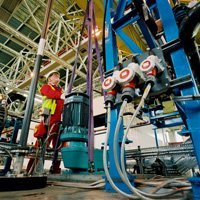
The following NDA procedures, relating to its employees’ working environment, show the importance of health and safety issues:
- It is a disciplinary offence not to obey H&S requirements. Employees need to be well educated to ensure instructions are followed clearly and put into practice.
- Health, safety and security for people and the environment are a key objective of the NDA. The toxic nature of nuclear materials requires great care to be taken at all times.
- Inspections are carried out regularly and any areas needing attention are dealt with immediately.
- NDA hosts events on ‘best practice’ for the nuclear industry. This helps businesses worldwide to benefit from NDA”s expertise.
- As a government-sponsored organisation, it reports on its performance in these areas.
- NDA is accountable to the Health and Safety Executive. This inspects premises to make sure that laws are being upheld.
The outcome of these practices is that employees across the industry enjoy probably the highest levels of safety of any employees in the UK.
Labour law
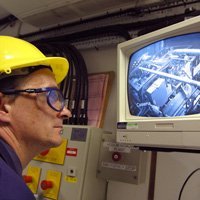
The Energy Act sets out the responsibility for the NDA to ensure there is an appropriately skilled workforce available to carry out decommissioning and clean-up. The NDA has created Skills Action Plans to ensure that enough employees with the right skills are being trained to carry out this work.
NDA makes sure that all of its employees receive competitive remuneration packages and good working conditions. Particular focus is given to meeting all aspects of employment legislation. For example:
- The Equal Pay Act, 1970 guarantees equal pay to all employees for carrying out work that is rated as the same, similar or of equal value. This ensures equal pay between men and women
- The Sex Discrimination Acts, 1975 and 1986 (SDA) involves making sure that there is no discrimination between men and women in terms of recruitment, training, promotion and other aspects of work. All employees have the same opportunities The Race Relations Act, 1976 and Race Relations (Amendment) Act, 2000 (RRA) applies the same principles as the SDA in relation to race and religion
- The Disability Discrimination Act, 1995 (DDA) ensures that wherever possible employees with disabilities are helped to do their jobs. This includes adapting the working environment where it is reasonable to do so. For example, by providing wheelchair access, adapting computer keyboards and screens (for visual impairment) or other modifications, employees are able to continue working.
NDA seeks to exceed these requirements, so enabling the recruitment of the best possible workforce.
The business benefits of protecting the workforce
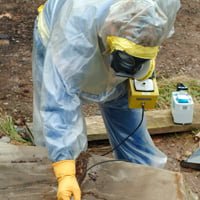
Meeting or exceeding legal requirements creates a number of business benefits for NDA. These include:
- reduced rates of absence. NDA sites have lower levels of absence from sickness than the national average.
- increased motivation of employees. Employees who feel safe and secure have confidence in their employer. They are likely to work harder. This creates a more productive and profitable business.
NDA has a significant training programme in H&S responsibilities. For example drivers are provided with advanced driving courses.
- the business is protected from claims. NDA operates a safety management system to record, report and act on issues. The result is that there are fewer claims against NDA.
- business goals of operating in a safe and secure way are met.
- NDA being seen in a favourable light by its stakeholders. For example, by NDA carrying out waste management and cleaning contaminated land, the local communities are made safer.
Conclusion
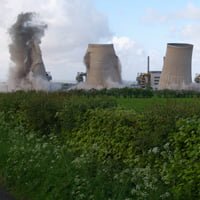
The UK has a long nuclear legacy. The NDA is the body given responsibility by the UK government to make sure that decommissioning and clean-up of nuclear sites is effective and safe.
NDA has created public confidence in its practices by meeting the necessary legal requirements. Through its commitment to health and safety NDA has helped move the UK towards being the leader in safe and secure practice.
NDA has ensured that its reputation is first in the field. This makes it a world leader whose practices are benchmarked and copied throughout the nuclear industry. The outcome of NDA’s work is to provide one of the safest work environments in the world.
